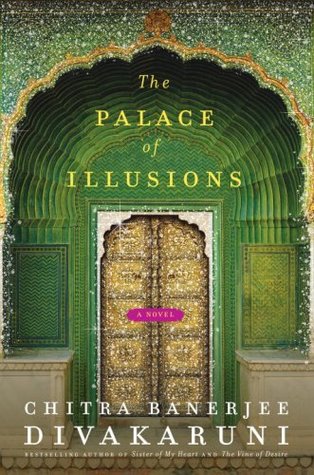
Ok, so I’d been wanting to read this one for a long time; it’s got very good word-of-mouth reviews. I had read Divakaruni’s Sister of My Heart a few years ago and liked it quite a bit.
For the uninitiated, the Mahabharata is one of the most important (and popular) epics in Hindu mythology (mainly because the Gita is contained inside it). It is a vast saga of family and betrayal and revenge and love and war and everything else you can probably think of. The Palace of Illusions is Draupadi’s version of the Mahabharata, a feminist take of sorts on the epic. I liked the book; as a story on its own, it’s quite good, it is when it deviates from the original that it becomes indigestible.
The title here is derived from the dazzling and mystifying palace built for the Pandavas in Indraprastha by the asura architect Mayan. It is said that Duryodhana, when, visiting the palace, failed to realise that he was stepping into a pool instead of just glass, and wet his clothes. At this point Draupadi, who was looking down on this scene from an upstairs balcony, burst into laughter and remarked about a blind king’s son also being blind (Duryodhana’s father is the blind Dhritarashtra), which statement, it is said, led to the attempted public disrobing of Draupadi and the subsequent Kurukshetra war. All these incidents the author uses to great effect, and the story as a whole is quite gripping.
The language is fluid enough, and at some places the poetic prose really shines through:
Later, long after a forest was razed and a palace filled with wonders built in its place, after the game of dice, after treachery and loss, banishment and return, after the war with its blinding mountain of bones, bards would immortalize the swayamvar where, some claim, it all began.
In that hall perfumed with hopes and decorated with anxieties, where pride played the flute and anger the drum, the greatest kings of Bharat were unable to lift the Kindhara bow from the ground.
The trouble, however, lies in the characterisation; the author creates entirely new characters and gives them old names.
Draupadi, for example, is in love with Karna (in this version and this version only) and thinks of him even as she lies dying, and Karna (friend of Duryodhana, the enemy) actually reciprocates.
I tried harder than ever before to bar Karna from my mind. But can a sieve block the wind?
I confess, in spite of the vows I made each day to forget Karna, to be a better wife to the Pandavas, I longed to see him again.
Eh? What? I would have thought the Mahabharata has enough story material for any author to comfortably confine their versions inside its rather broad boundaries, than resort to sensationalism. Admittedly, “ANCIENT INDIAN PRINCESS SECRETLY IN LOVE WITH HER HUSBANDS’ ENEMY” does sound much better than “ANCIENT INDIAN PRINCESS SECRETLY IN LOVE WITH HER OWN HUSBANDS”, but it begins to jar after a point, especially when the author insists on further tweaking little details that makes the whole epic sound like one of our daily soaps (unkind mother-in-laws (Kunti!), woman power, that sort of thing).

As a woman’s version (and the most important woman at that), the story could have been framed in a better manner, but Divakaruni presents Draupadi as a rather put-upon woman, and burdens her with so many miseries that she becomes more of a representation of all the troubles women in general have, instead of just her individual sorrows. That she was publicly insulted and had to lead 13 years in exile is not enough, she must also have an unhappy childhood, be unable to marry the one she loves, have a scheming mother-in-law..why, Chitra aunty, why?
I am not against derivations and perspective changes; written in a proper manner, they could enhance our understanding of mythological texts (oooh this sounds so technical.. 😛 ). But drastic changes are a big no-no. What if, tomorrow, someone rewrote Harry Potter and had Hermione fall in love with Malfoy while still married to Ron (ugghh), and more importantly, what if, some catastrophe takes place and all our copies of Mahabharata are lost, and only this version remains? *Shudders* But it is quite a good read if taken as fiction, so don’t let this deter you.. 🙂
P.S. To be fair, there is a “This is a work of fiction” disclaimer in the book; I just wish they’d put it on the cover, or even in slightly bigger font.
P.P.S. This is Book 6 in the Brunch Book Challenge and the 2nd Indian one..so please visit me on Twitter @sindbadrose and #BrunchBookChallenge for the challenge.. 🙂